We’re delivering our Game of Thrones recaps in a series we call Game of Thrones Unlocked. These articles will contain spoilers through the episode under discussion. This week, Matthew Wrather tackles “Eastwatch” (Season 7, Episode 6).
“You have to see it to know. Now I know.”
One of my pet peeves with lesser dramatic storytelling is a plot involving trivial misunderstandings and uncharitable assumptions which could cleared up with a candid three minute conversation. Let’s call it the Gossip Girl problem: when characters decide to remain willfully ignorant despite readily available information; when they assume the worst of others against manifest evidence; when they act in ways they ought to know are contrary to their own interest. It’s not that this kind of thing never works, it’s just that it has to be handled deftly and with a great deal of psychological insight.
Game of Thrones has had a problem like this for several years now. We realize that the important thing on the horizon is the apocalyptic battle between the living and the dead, and it’s been a little frustrating how slowly some characters have cottoned on. Now only Cersei still thinks the show she’s in is Gossip Girl, though, to be honest, Blair Waldorf was crueler to her enemies.
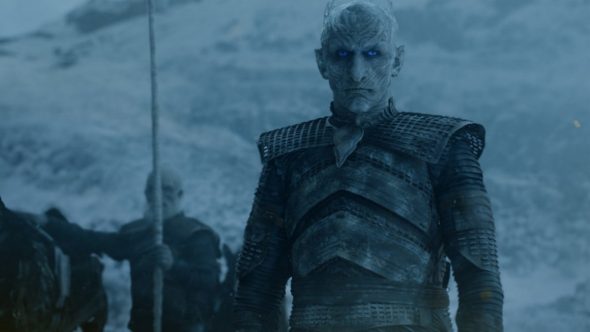
The Night King is real, the army of the dead is real, they can kill dragons, and if you don’t know, now you know, Daenerys. “You have to see it to know,” she insists, a point underscored by the first shot in the episode, as the camera sweeps over the model of Westeros in Dragonstone, quickly fading into a shot that sweeps over the frozen lands north of the wall. The map is not the territory.
Do you actually have to see it, though? What sorts of knowledge can you pass along or pass down? How do we learn, how do we see from others’ (maybe even the Others’) points of view? Daenerys generally benefits from comparisons to her father, but north of Eastwatch, as the Magnificent Seven march toward whatever awaits them, Jon and Jorah wonder how they measure up to theirs. (And yes, before you “well actually” me, it’s highlighted in that very conversation that Jon doesn’t look much like Ned.)
Both Jeor Mormont and Eddard Stark were severe men—righteous, unyielding northerners whose internal compass never lost track of their sense of right and wrong. They were both tested by life, both fatally, and the non-fatal tests had the effect of strengthening the rigidity of their convictions rather than tempering them. Both were leaders and intimidating role models, and as they talk, Jon and Jorah find themselves in moral territory as unfamiliar as the physical landscape they are traversing.

Having spent so much of their lives anxious to live up to their fathers’ example—or guilty that they haven’t—they now question whether all that rigidity is such a good idea after all. They wonder what lessons to draw from history. “I’m glad my father didn’t catch you,” Jon reassures Jorah, who had fled from Eddard Stark’s sentence of death as a punishment for his role in the slave trade. And Jorah doesn’t want his sword back. “He gave it to you,” he says. “I forfeited the right to claim his sword.” Sticking to your guns in the face of hardship is certainly strong, but it has a downside: Mance Rayder’s stubbornness, for example, killed untold thousands of his people.
Back at Winterfell, Game of Thrones is eager to demonstrate that last episode was an anomaly and that it will continue to move at a brisk pace by staging the confrontation between Arya and Sansa right away. This has a bit of the Gossip Girl problem; I’m disappointed that they’re both so easily taken in by Littlefinger’s transparent stratagem. Everyone warns each other about that guy, and apparently no one listens to anyone. But I think we can cut them some slack, because the conflict rings true psychologically, and siblings can have notoriously difficult relationships. Despite all they’ve suffered—and they have, both of them—conflict makes them neurotic, and they can’t see one another’s points of view. They fall back on old patterns. (Still and all, just go talk to Bran, who knows everything!)
My sympathies are entirely with Sansa—Arya is too harsh, too quick to condemn, too like her father—and I’m glad that Sansa gets a couple good swipes in. But the interesting part of the scene is the story Arya tells about practicing archery in the yard while her father watched her unseen, revealing himself by applauding her first bullseye. “I knew that what I was doing was against the rules,” Arya remembers, because girls shouldn’t be training on weapons. “But he was smiling, so it wasn’t wrong. The rules were wrong.”
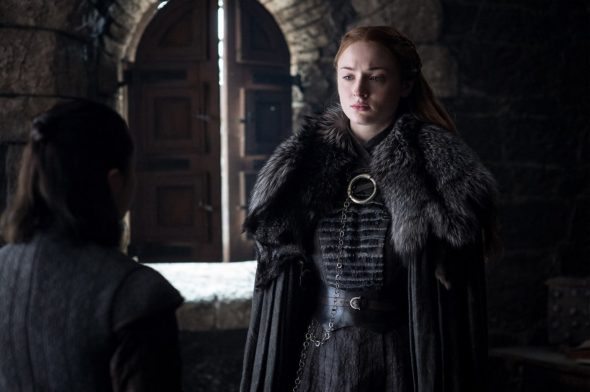
On one level, it’s pertinent to note that there are two dichotomies being set up here: a 2-dimensional grid with “rules vs. against-the-rules” on one axis and “right vs. wrong” on the other. A female archer is on the bad side of one dichotomy but on the good side of the other. But examined more closely, this observation begs the question. Rules are fossil morality—they are meant to encode the lessons that experience has taught our forebears about right and wrong. If the rules don’t tell us the difference between right and wrong, what does?
I realize that rigidity vs. flexibility was my theme three weeks ago. Maybe I just have a limited interpretive palate, but maybe George RR Martin’s project as a revisionist of heroic fantasy is related to the question of what happens when you evacuate the easy answers from your moral universe. Cersei and Jamie are the only holdovers from Ned Stark and Robert Baratheon’s generation, and Cersei’s probably faking her pregnancy, so they’re not likely to pass along their wisdom to the next generation.

Back north of the wall, they too are stuck for answers. Tormund and the Hound are like brothers—too alike to see that they’re alike. They’re mirror images of each other, but the Hound’s impulsiveness has led him into cynicism, and Tormund’s into a epicureanism, a kind of joyful celebration of sensation and experience. Even Brienne’s hostile glares are a cause for celebration and excitement. He’s even excited to learn new words: “Dick. I like it!” he exclaims, learning a name for his favorite preoccupation, and the Hound is quick with the rejoinder, “I’ll bet you do.”
Jon and Beric are having a more sober conversation, more immediately related to the moral question on our minds. “What’s the point of serving a god when nobody knows what he wants?” Jon asks Beric. That is, how do you come to know the point of view of a cosmic entity, especially one who seems to have such specific plans vis a vis this very campaign? The multiple resurrectee doesn’t have a good answer. He supposes that maybe it’s not our role to know, but his ultimate answer is more existential: “Death is the enemy. The first enemy and the last. The enemy always wins, but we still need to fight him.”
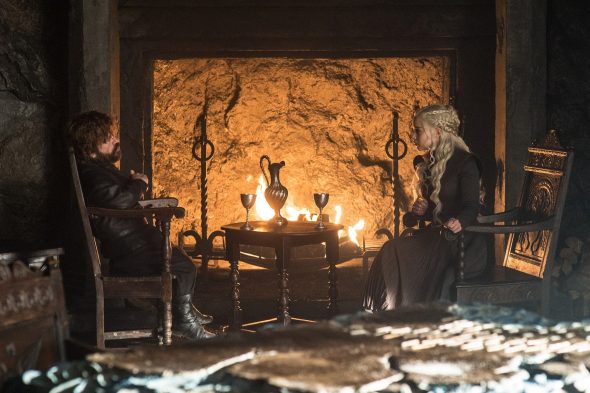
Doomed causes seem noble, and on Dragonstone, moral absolutist Daenerys would tend to agree that they are. To her, falling in service of a noble cause is itself noble, or at least she doesn’t want to think through the implications. And what’s more, the ends justify the means. Because she believes she is the rightful heir to the Iron Throne, anything goes: “What war is won without deceit and mass murder?” she fires back at Tyrion, who has the audacity to use those terms pejoratively. He is more practical, more worried about winning the peace, more committed to her vision than even she is, since her conception of “breaking the wheel” is tied up in her birthright, and his is more concerned with plan B. So he is the one who articulates most clearly the practical need to see things from a different perspective, and draw lessons from a source other than experience.
It’s at this point that the episode kicks into gear, and also at this point where the plot holes—who honestly thought that Cersei would listen to reason, and that bring her an actual zombie would help?—sort of fade in the face of rising tension. If only the holes in the ice were so easily and widely gaping. For what it’s worth, it’s also the point where my notes start to be in all caps, and where I may have actually leapt off the couch. “ZOMBIE BEAR!” “OH SNAP FROZEN LAKE!” “C’MON GENDRY!” The idea that this could go horribly, horribly wrong occurred to all of us last week, right? Where was Tyrion with the Plan B?
At Winterfell, Littlefinger goes full “evil genius” (seriously, nobody sees this dude coming?); Arya goes full Dexter, and then full third-wave feminist (female identity is a social construct, here’s a bag of faces as proof); Sansa goes full adolescent tantrum (pro tip: If you have to remind your sworn protector that you’re a grown-up, you’re not really a grown-up). I’m a little shocked that the confrontation between Sansa and Arya over the Bag o’ Faces comes after the huge reveal of Jon scrambling out of the frozen lake—they didn’t even make us wait a week, like they did with Jaime—since the latter seems like the bigger deal, both in the scope of the plot and, you know, cosmically, in terms of avoiding death. But there’s a Zombie Dragon, so I guess they have to dispense with the living before they get to that, with Jon’s hypothermic return to Eastwatch a heightened repetition of Gendry’s earlier collapse at the gate.
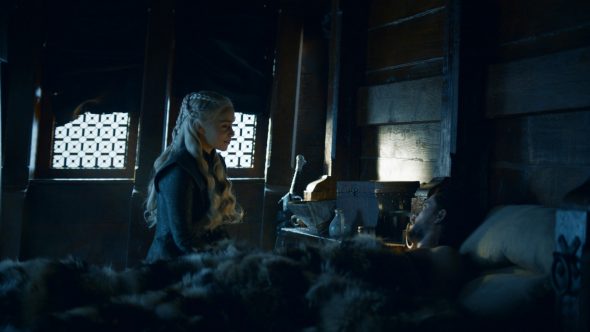
And then it’s Darmok and Jalad on the Ocean: Daenerys uncomfortably fingering Jon’s hand, Jon pledging that he’d kneel if only he could get up; Dany’s—excuse me, “My Queen’s”—weeping smile as she realizes what she’s sacrificed to see what she’s seen and to know what now she knows. Loss, it turns out, is the great teacher, and in a world where everyone seems to have lost their parents, loss of a child is the greatest teacher of all. How ironic, then, for those of us that watched the scenes from next week’s finale (what?), that Cersei, who has arguably lost more than anyone, seems to have learned all the wrong lessons.
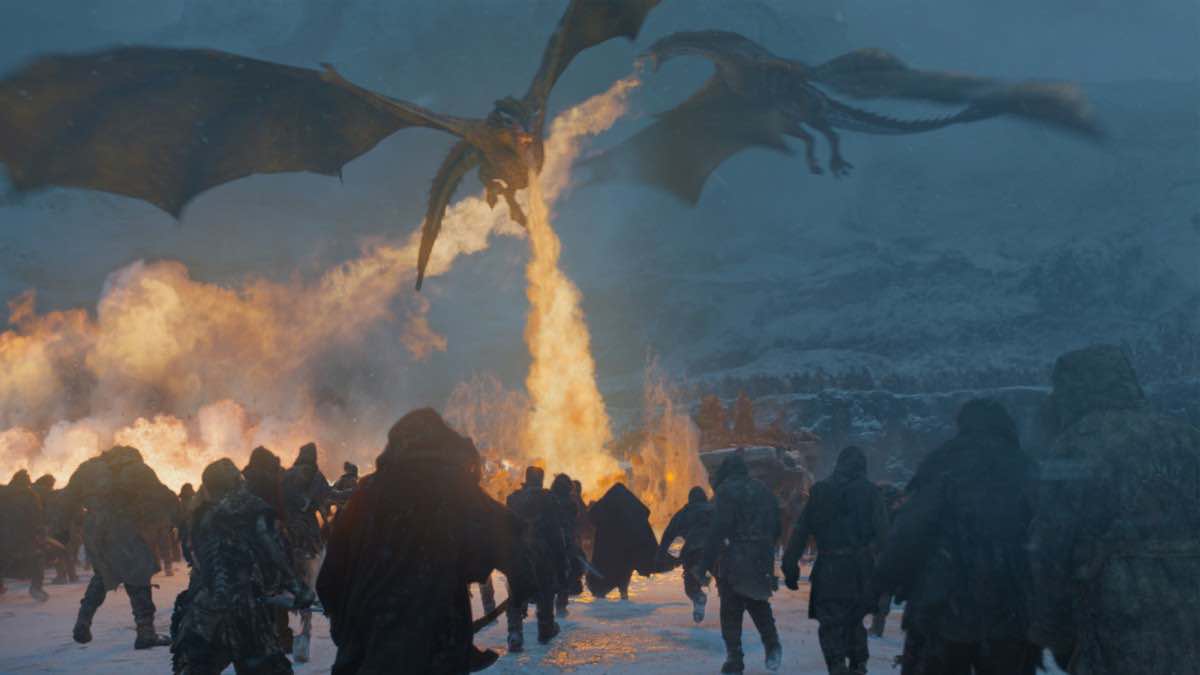
Not just a zombie bear but a Viserion is now ZOMBIE DRAGON. That’s a problem.
The dragons bring up The Lord Of The Rings question: If you have big flying creatures, why not just fly where you need to go and avoid a lot of hardship?
So we have two dragons left. I read that the dragons are hermaphrodites and we know they lay eggs. So the two surviving dragons can get together. Which is incest, but that’s never stoped anyone on this show before.
We still have the most important question left to be answered: does the resurrected Viserion breath fire or ice?
Ain’t gonna lie, when Sansa slowly opened that leather satchel, I was saying, out loud “PLEASE DON’T BE PODRICK PAYNE’S SEVERED HEAD. PLEASE DON’T BE PODRICK PAYNE’S SEVERED HEAD.”
I may have a more worst-case-scenario attitude than a lot of people who watch the show.
Anyway, in retrospect, my favorite part of the episode is probably the “Dylan Thomas practicing romantic but inadequate self-care” conversation between Beric Dondarrion and Jon Snow.
“You ever wonder who raised us from the dead or why?”
“I know who did it! God did it! And He did it for a reason!”
“Yeah, but this is all really odd. I’m alive when I should be dead, I’m here when I should be somewhere else. Presumably if somebody wants me alive and wants me here, I should try to understand their intentions.”
“The intentions of life are life! And to not be dead! That is enough! Life is good, and death is bad!”
“Well, yeah, but everybody is mortal and that doesn’t really explain our situation…”
“DO NOT GO GENTLE INTO THAT GOOD NIGHT!”
“But I already did, and as much as it sucked I didn’t want to come back…”
“OLD AGE SHOULD BURN AND RAVE AT CLOSE OF DAY.”
“Well, yeah, but do we have to do it here? Now? We’re kind of losing the thread.”
“RAGE, RAGE AGAINST THE DYING OF THE LIGHT.”
“I mean, that does sound pretty awesome.”
“Look, we’re soldiers! We do what we’re told!”
“Yeah! Wait, I’m not a soldier, I’m the king! I’m the one telling everybody here to do this! And I just told you I don’t understand why I am doing anything. Shouldn’t this concern you, since I’m one of the people who told you to do it? And who else told you to do this, by the way?”
“Ours not to question why! Ours but to do and die!”
“But do what? And for whom? All the soldiers in the world, almost to a man, are fighting in pointless wars against their own interest, mostly caused by greed and misunderstanding. Should we consider that as context for our current actions?”
“It’s not the job of soliders to think about why the war they are fighting in is a metaphor for human folly. It is the job of soldiers to fight!”
“Fight?”
“FIGHT!”
“FIGHT!’
“FIGHT!”
“YEAH!”
“YEAH!”
“WHICH OF US IS TALKING?”
“I DON’T KNOW!”
“Hey guys we just got to that mountain that a magical vision told us we had to come to and that we decided to go to without questioning who sent the magical vision or for what purpose.”
“Great! Beric and I were just talking about doing things without questioning whose agenda you are serving! It sure is existential!”
“Ah! Look! It’s the Night King! I’ve always felt drawn to the Night King! I knew I was going to come see him someday this whole time!”
“Wait, what?”
“What?”
“Yeah! That guy! I see him all the time in my visions! He’s totally the reason I’m here!”
“But you just said you didn’t understand the reason you were here.”
“Well, I said that I don’t know why God wants me to inexorably come toward the Night King. Who knows? God is so mysterious!”
“That is not what you said, and it is not mysterious! That is a very important piece of information that you withheld during this very important conversation!”
“Yeah, that’s not mysterious at all. That’s just adding an extra level of abstraction to something that is pretty clear and obvious because you are uncomfortable with the reality of it and prefer it to appear mysterious.”
“Jorah, nobody asked you.”
“Yeah, sit on it, Friendzone.”
“Nice one, bro!”
“Nice!’
“Okay, so, wait, what were we talking about again? The zombies are surrounding us and keeping us here when they could easily kill us in any number of ways, or just leave. What reason could they have for doing this?”
“What did I say about reasons, Jon?”
“That God is the reason?”
“I said RAGE! RAGE AGAINST THE DYING OF THE LIGHT!”
“What?”
“FIGHT!”
“FIGHT!”
“FIGHT!”
“FIGHT!”
“WHO IS TALKING?”
“WHERE DID GENDRY GO!”
“HEY NIGHT KING NICE TO SEE YOU HOPE EVERYTHING IS GOING WELL FOR YOU WE’RE GOING TO KILL YOU EVENTUALLY HAHA.”
“EVERYTHING’S GREAT, THANKS! RIGHT BACK ATCHA! OH, AND LORD BERIC?”
“YEAH?”
“THE NIGHT IS DARK AND FULL OF TERRORS!”
“TOTALLY!”
“IT IS THE ONLY THING THAT MATTERS AND YOU SHOULD FOCUS ALL YOUR ATTENTION ON THAT AND NONE ON WHAT YOU ARE ACTUALLY DOING!”
“TOTALLY!”
“BECAUSE REMEMBER, THERE IS ONLY ONE BATTLE, AND IT IS AN ABSTRACT BATTLE THAT NEVER ENDS THAT YOU WILL NEVER UNDERSTAND AND WILL NEVER HAVE ANY AGENCY IN, SO DON’T BOTHER YOURSELF WITH IT!”
“TOTALLY!”
“TOTALLY!”
“Wait, what?”
“DICK JOKE!”
“SOLID.”
A lot of viewers and reviewers hate how Arya and Sansa seem to have fallen for Littlefinger’s ploy to get them at each other’s throats. Let me suggest a different read of the last couple of episodes.
Consider: this season Sansa has said, unenthusiastically, that she knows exactly what Littlefinger wants. They both know, from experience, that Littlefinger is a schemer and that he keeps a network of spies.
And then come the confrontations between Sansa and Arya:
* In the previous episode, in Sansa’s chambers, she observed that it took a coalition of armies (including the Vale) working together to take back Winterfell, and they needed them working together.
*Early in the most recent episode, Arya walks around outdoors reading the stolen note aloud, making accusations and insults. Sansa points out that they reconquered Winterfell because the Knights of the Vale won the battle.
* At the end of this episode, in Arya’s room, she reveals to Sansa that she can impersonate anyone completely if she just gets that person’s face… and then _hands Sansa the assassin’s dagger_.
Any eavesdropper to this conversation, and the preceding conversations, would conclude that the sisters are at each other’s throats to the point of open threats. But when Arya silently hands over the dagger, it’s a suggestion: they can get rid of Littlefinger and still command the Knights of the Vale by having Arya wear his face.
And in between the last two conversations, when the straightforward reading of Sansa and Arya’s conversations would suggest Sansa is imminently threatened by Arya, Sansa seeks Littlefinger’s advice about how to deal with Arya, and he tells her that Brienne could easily be used against Arya, since she’s honor-bound to protect either sister from harm. What does Sansa do? She hurries the easily manipulated Brienne far away, to King’s Landing.
This pattern suggests that the sisters have an understanding. Their words, which might be overheard by Littlefinger’s spies, suggest they’re fighting, but the subtext is that they’re plotting. Sansa and Arya talking over what’s necessary to hold Winterfell (they need Littlefinger’s men and the northern lords), Sansa figuring out what pieces Littlefinger would use against Arya and then removing those pieces, and finally Arya offering a way to resolve the situation.
If that’s not what’s really going on between the Stark sisters, I’ll be disappointed. But even though my reading suggests the sisters are cleverer than they first appear, they may still have tipped their hand when Sansa sent Brienne away.
In fact, the Stark sisters’ plot could go back to their first scene after Arya reunited with her siblings. That’s when Arya dueled Brienne, just as Sansa happened to be walking above with Littlefinger in tow and happened to take notice of the pending duel. Arya establishes in that conversation that Brienne swore to serve both of Catelyn’s daughters, loud enough for the onlookers to overhear. And then, of course, Arya shows off her fighting skills in the open.
Arya may have been deliberately making herself look like a threat so that (a.) Sansa would have a pretext for being suspicious of this new Arya and (b.) Littlefinger would see Arya as someone who needed to be plotted against. And if Arya dropped the hint about Brienne for a reason, well, Littlefinger lapped it up.
I want to agree with you. Because I want Littlefinger to die and I want Sansa to beat him. And I want the Stark sisters to reconcile.
However, I have doubts on a metatextual level. One of the things that I’ve noticed is that the showrunners plots seem to be a lot more simplistic, and sometimes even outright dumb, than Martin’s. And now that the show has almost completely detached itself from the books, I have a hard time believing the show isn’t just following the most obvious trajectory possibly in every plot thread.
The plan north of the wall is a perfect example. I really doubt Martin would have crafted a zombie kidnapping plot where everyone just gets saved by the dragons at the last minute. Especially considering that there was always the option to just go up there with the dragons in the first place.
So, I have a lingering suspicion that the Arya/Sansa conflict is a straightforward as it seems to be on the surface. But, I’m actually hoping I’m wrong about that.
Like DeanMoriarty, I *hope* that the Stark sisters are running some kind of long con. But I keep waiting for the show to use Sansa as something other than a) a punching bag, or b) someone who makes catastrophically bad decisions. And it just keeps on never happening.
I don’t think it makes sense to think that Arya and Sansa have been running some long con the whole time – their conversation in Arya’s chambers was legitimately tense, and I think it would be too cute by half for them to have staged it specifically for the benefit of unseen spies. If they were going to play that card, they would have had to show the spy listening, I think.
THAT SAID, I think (or maybe just hope) DeanMoriarty is right that Sansa is running some kind of counter-con to Littlefinger’s. It would be SO frustrating if she had learned nothing after all the brutalization she’s been through over the years. It would also be extremely dull if the super-obvious plan that Littlefinger is running is the only thing this plot has to offer.
The interesting part about the Sansa/Arya story is that they have both been through a similar journey of hardship and transformation, but in entirely different spheres of power – Arya has learned mega-assasin skills, and the season opener showed just how powerful that has made her. But Littlefinger’s plan shows the limits of that power – she doesn’t have the political sophistication to always know when to apply that violence effectively. It would be great if we could see that Sansa, the “Princess” shows that she has learned every bit as much as Arya, just in the world of court intrigue, rather than violence.
And the Brienne conversation certainly seems like a feint in that direction – Sansa’s going directly against Littlefinger’s advice, which wouldn’t make sense if she were just going to fall directly into his trap. So I think it’s quite possible that even if she didn’t ALREADY have a complete plan to deal with Littlefinger, she’s going to figure out some way of using Arya’s skills to checkmate or eliminate Littlefinger.
One possibility that could also come into play: Sansa uses Littlefinger’s desire for her against him. His desire for Catelyn (and now Sansa) has always been Littlefinger’s weakness, and Sansa knows it. If I were writing the next part of this arc, I would probably have Sansa make an offer of marriage (or something like that) to Littlefinger, apparently out of fear of Arya. Then we get some sort of reveal where Littelfinger is outed, and either Sansa or Arya gets to stab him with the knife that started it all.
But as has been said above, this might be optimistic considering the streamlining of plot that’s happened post-GRRM.
I read the Brienne thing differently. Littlefinger wasn’t telling Sansa “maybe you could use Brienne against Arya.” I mean, that’s what he said. But what he meant, and the message that Sansa received, was “if you want to move against Arya, you’re going to need to get Brienne out of the way.”
I would almost bet that, in the first draft of the script, the bedroom confrontation was meant to happen BEFORE Sansa sends Brienne away. It makes more sense like that: when Littlefinger is stirring the pot, Sansa basically tells him off. So why is she making preliminary moves against Arya in her next scene? On the other hand, after the bedroom confrontation, Sansa has every reason to be terrified of Arya. Sending Brienne away, then, becomes the confirmation of just how badly Sansa has been rattled.
The emotional arc of the episode is better served by putting the bedroom scene where it fell, though, which is probably why they made the change (assuming I’m right).
You might of course ask why, if Sansa was so scared, she would send away her most competent bodyguard. But Sansa doesn’t trust Brienne to keep her safe. (She didn’t keep her safe from Ramsay.) Brienne would only be a useful protection from Arya in a stand-up fight… and that isn’t the tactic that Arya would use. No: if we read the show at face value, Sansa is convinced that she needs to take Arya out with a preemptive strike before her sister loses it and murders her in her sleep. Brienne wouldn’t be on board with that, so she needs to be removed from the equation.
“their conversation in Arya’s chambers was legitimately tense, and I think it would be too cute by half for them to have staged it specifically for the benefit of unseen spies.”
That last conversation does create some doubts about Sansa being part of a conspiracy up to that point. Sansa and Arya’s first confrontation happened in Sansa’s chambers, and Arya just left the door open as they argued; and their second confrontation happened outside with raised voices, which seemed like it was inviting eavesdroppers. But the third was behind closed doors, and Sansa still managed to look troubled.
But Arya seemed to be playing things fairly cute with the “game of faces” in that last conversation. Arya’s never shown the slightest curiosity about what it would be like to wear Sansa’s pretty dresses or be the Lady of Winterfell, as Sansa well knows. And immediately after explaining what she can do with someone’s face, she hands over the assassin’s dagger, which doesn’t strike me as a mere taunt.
Stokes is right that Littlefinger’s advice can easily be read as, “You need to get Brienne out of the way if you want to move against Arya.” So sending Brienne away and then trying to steal back the scroll would be logical opening moves… if she meant to do real harm to Arya. But is Sansa really contemplating doing something to Arya that Brienne would try to stop?
Anyway, you each make good points, and I am unsure of my theory. But I’ll still be disappointed if it turns out Sansa and especially Arya have fallen into Littlefinger’s trap as clumsily as it first appears.
I think Arya has fallen into LF’s trap, but Sansa has not.
Prediction time: I think LF is going to die in the season finale. His mode of operation arguably becomes less interesting as the Night King approaches, and I think they reintroduced that knife as a poetic way of killing him off.
For what it’s worth, I’m taking the low-percentage bet that Arya in Winterfell is an impostor, real Arya is at King’s Landing right now, and there will be a twist where both Aryas are revealed and one is murdered and there’s a cliffhanger so we don’t find out which is which until next season.
I WANT TO BELIEVE.